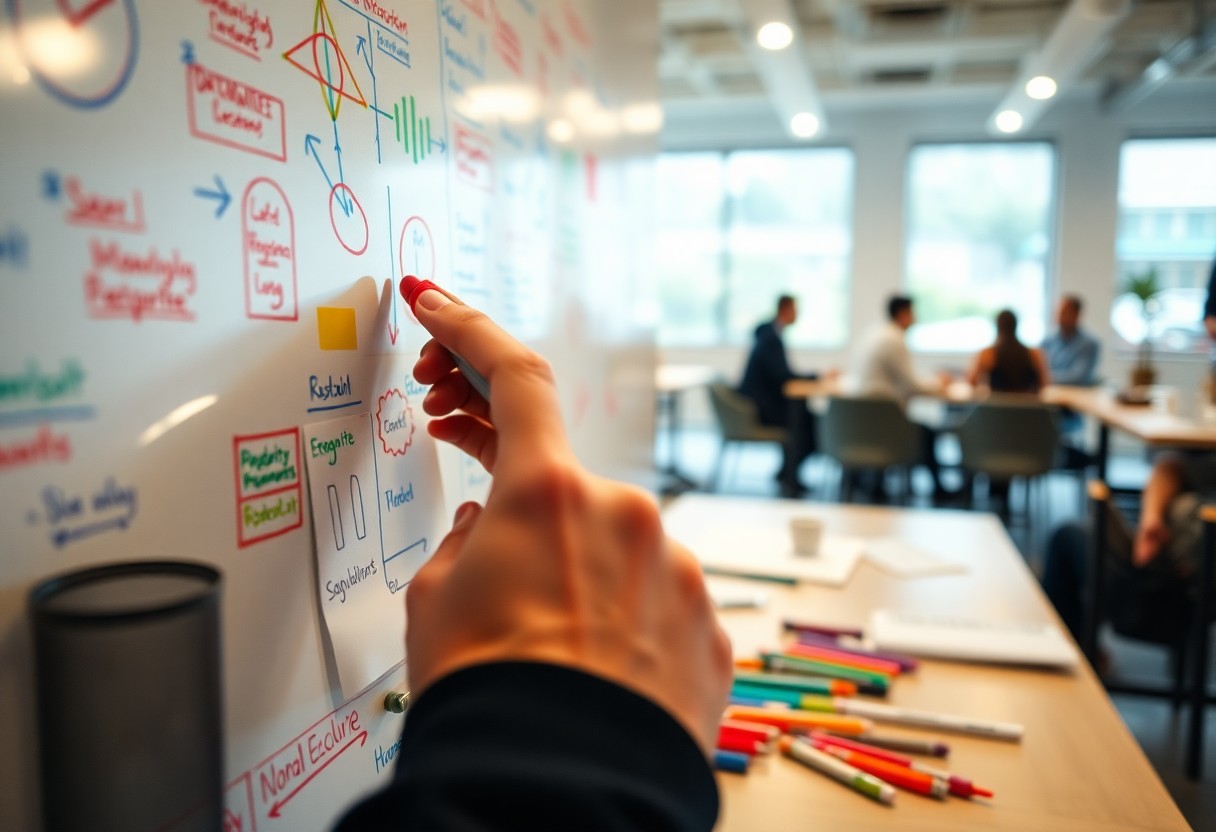Resilience in the face of mistakes is key to your personal growth. Embracing your errors allows you to turn setbacks into valuable lessons, fostering a healthier mindset. Instead of succumbing to self-blame, focus on the insights gained and the skills developed through each experience. This approach not only enhances your ability to adapt but also encourages you to cultivate a positive outlook on future challenges. By shifting your perspective, you empower yourself to evolve without the weight of guilt holding you back.
With the right mindset, you can transform your missteps into valuable lessons without resorting to self-blame. Embracing mistakes as part of your growth journey enables you to analyze your actions objectively and identify areas for improvement. This approach fosters a supportive environment where you can cultivate resilience and confidence, allowing you to face future challenges with a sense of empowerment rather than fear. Shift your perspective to see failures as stepping stones towards success, enhancing your ability to achieve your goals.
Understanding Mistakes
Defining Mistakes: Types and Implications
Mistakes can be categorized into several types, each with unique implications for you. Errors of omission arise when actions are not taken, while errors of commission occur when incorrect actions are performed. Judgment errors are often due to poor decision-making processes, and association errors happen when you wrongly associate cause and effect. The consequences of these mistakes can range from minor inconveniences to significant setbacks in your personal or professional life.
| Type of Mistake | Implication |
| Errors of Omission | Missed opportunities |
| Errors of Commission | Increased costs |
| Judgment Errors | Poor outcomes |
| Association Errors | Misguided actions |
| Perception Errors | Skewed reality |
Perceiving these types in your life can help you navigate through challenges without falling prey to self-blame.
The Psychology of Mistakes: Why We Make Them
Understanding the psychology behind mistakes provides valuable insights into human behavior. You might make mistakes due to cognitive biases, emotional reactions, or social pressures. For instance, the availability heuristic might lead you to overestimate the likelihood of certain outcomes based on recent experiences, provoking impulsive decisions. Emotional responses, such as fear of failure, can cloud your judgment, preventing you from evaluating situations clearly. Additionally, societal expectations often influence how you approach risks, sometimes causing you to avoid making any decisions at all.
In fact, research suggests that up to 70% of decision-making errors stem from emotional biases rather than logical reasoning. This emphasizes the need for self-awareness when reflecting on past mistakes. Acknowledging that mistakes are part of the human experience helps mitigate feelings of inadequacy and encourages a more objective view of the decision-making process.
The Role of Mistakes in Learning and Growth
While mistakes can be disheartening, they serve as critical learning tools. Each error offers you a chance to analyze what went wrong and how you might approach similar situations differently in the future. Embracing a growth mindset allows you to see mistakes not as failures but as opportunities for improvement. In fact, studies have shown that individuals who analyze their mistakes show a 30% increase in overall performance, highlighting the direct correlation between understanding errors and enhanced outcomes.
Even when faced with challenges, you can pivot your focus to what lessons can be drawn from the experience. By identifying the root cause and evaluating the factors that contributed, you engage in a process that fosters resilience and adaptability.

Understanding the Nature of Mistakes
Definition of Mistakes
Mistakes often arise from a combination of misinformation, misjudgment, or oversight. They can manifest in various forms, including errors in decision-making, execution, or perception. Understanding that mistakes can be seen as opportunities for growth is crucial. Viewing them strictly as failures diminishes their potential for learning and improvement.
The definition of a mistake can further be nuanced by context; what constitutes a mistake in one situation may be entirely acceptable in another. This contextual nature means that you must evaluate each mistake individually, considering both the outcomes and the intentions behind your actions.
The Psychological Aspects of Error
Psychologically, mistakes can trigger a range of emotional responses, including shame, guilt, or frustration. Each of these feelings is linked to our self-image and how you perceive your competence. A cognitive bias known as the negativity bias often amplifies these feelings, as your brain naturally focuses more on negative outcomes than positive ones. This emotional reaction can hinder your ability to effectively learn from an error.
Furthermore, the fear of making mistakes may lead to avoidance behaviors, ultimately stifling your personal and professional growth. By addressing these psychological barriers, you can cultivate a more constructive mindset toward mistakes, allowing for resilience and adaptability.
Types of Mistakes: Intentional vs. Unintentional
Mistakes can generally be categorized into intentional and unintentional types. Intentional mistakes are made with awareness and an understanding of the choice you are making, yet it may lead to negative outcomes. For example, a calculated risk in business might result in a loss despite thorough analysis. Conversely, unintentional mistakes occur without foresight or deliberation, like miscalculating figures in a report. These distinctions can influence how you approach learning and accountability.
In assessing mistakes, you may find it useful to consider why they occurred. An intentional mistake might reveal a need for better judgment or risk assessment, while an unintentional one might highlight gaps in knowledge or skills. Understanding these distinctions allows you to adapt more effectively in similar situations.
| Type of Mistake | Description |
|---|---|
| Intentional | Made with full awareness and thought |
| Unintentional | Occurs without prior intent or understanding |
| Systematic | Results from repeated actions regardless of intent |
| Random | Occurs spontaneously and unpredictably |
| Reckless | Driven by a disregard for consequences |
By recognizing the differences between intentional and unintentional mistakes, you can significantly enhance your learning process. Each type presents unique opportunities for self-reflection and improvement, enabling you to develop better strategies for future situations.
- Intentional mistakes aid in understanding risk.
- Unintentional mistakes highlight knowledge gaps.
- Systematic mistakes show patterns in behavior.
- Random mistakes often offer surprising lessons.
- Reckless decisions demand a reevaluation of priorities.
Recognizing the types of mistakes can help you focus your efforts on what areas truly need improvement, paving the way for personal growth through the lens of each experience.
The Impact of Self-Blame
What is Self-Blame?
Self-blame is the tendency to hold yourself responsible for negative outcomes, often leading you to internalize failure. When something goes wrong, your immediate response may be to criticize your actions or decisions, which can create a pervasive sense of guilt and shame. This internal dialogue convinces you that you did not do enough, or that you are unworthy of success, impacting your self-esteem and overall mental health.
You may find yourself ruminating over past mistakes, believing that if you had chosen differently, the outcome would have been more favorable. This thought pattern is not only unproductive but also distorts your perception of accountability, as it often ignores external factors that were beyond your control.
How Self-Blame Affects Mental Health
Self-blame significantly affects your mental health, potentially leading to anxiety, depression, and increased stress levels. When you constantly point fingers at yourself, you’re likely to cultivate a negative self-image and low self-worth. Studies have shown that individuals who engage in self-blame are at a higher risk for developing mental health disorders, as the layers of guilt and self-critique pile up over time.
This cycle of self-recrimination can trap you in a state of emotional distress, making it difficult to engage in healthy coping mechanisms. The constant negative self-talk diminishes your motivation and can prevent you from taking the necessary steps to learn from your mistakes.
By underscoring personal failures, self-blame diverts your attention from constructive solutions. Instead of focusing on how to improve or rectify the situation, you become stuck in a mindset that paralyzes growth and development.
The Cycle of Self-Blame and Avoidance
Self-blame often culminates in a detrimental cycle of avoidance. When you feel responsible for a mistake, your instinct may be to shy away from similar situations in the future, fearing further shame or guilt. This avoidance reinforces your belief that you cannot succeed, leading to a pattern where you intentionally steer clear of opportunities that could foster personal growth.
This cycle can manifest in numerous ways, such as withdrawing from social interactions, avoiding professional challenges, or neglecting personal development. The more you shy away from these situations, the stronger your self-blame and feelings of inadequacy become, creating a vicious loop that is hard to escape.
Consequently, the avoidance behavior may lead to missed opportunities and stagnation in your personal and professional life. Instead of confronting challenges and learning from them, you become entrenched in a mindset that perpetuates self-doubt and reinforces negative beliefs about your abilities.
The Impact of Self-Blame
The Cycle of Self-Criticism
When you engage in self-blame, you often find yourself trapped in a repetitive cycle. Initially, a mistake triggers feelings of guilt or shame, leading to harsh self-criticism. This negative self-talk then reinforces feelings of inadequacy, making you more likely to avoid future challenges for fear of repeating the experience. Over time, this cycle can become a stubborn pattern that is hard to break, leaving you feeling stuck in a loop of negativity.
The cycle persists partly because it feels familiar. As you dwell on your perceived failures, you may become numb to personal growth opportunities, prioritizing self-punishment over resilience. This can lead you to miss valuable lessons or insights that arise from mistakes, further perpetuating the cycle of self-criticism and limiting your potential.
Emotional and Mental Health Consequences
The consequences of self-blame extend beyond mere feelings of guilt; it can significantly affect your emotional and mental health. Engaging in self-blame often leads to increased stress and anxiety, as your mind fixates on what you could have done differently rather than focusing on solutions. Over time, this behavior can contribute to more severe mental health issues, including depression and low self-esteem, creating a damaging feedback loop that drains your overall well-being.
Additionally, consistent self-blame can strain your relationships with others. As you withdraw into self-criticism, you might become less engaged with friends, family, or colleagues, leading to a sense of isolation. This social withdrawal can exacerbate negative feelings and hamper your ability to seek support, making it even harder to break free from the cycle of self-blame.
Research shows that individuals who frequently blame themselves are more likely to experience chronic anxiety and depressive symptoms. One study published in the Journal of Clinical Psychology found that self-blame is a significant predictor of emotional distress in various populations. Understanding these potential outcomes allows you to recognize self-blame and its deeper effects on your mental state, paving the way for healthier coping strategies.
How Self-Blame Affects Learning
Your ability to learn often hinges on your response to errors. When self-blame takes center stage, it can severely hinder your learning process. Instead of viewing mistakes as opportunities for growth, you’re likely to approach them with fear and anxiety, leading to a reduction in motivation and an aversion to taking risks. This fear stifles creativity and exploration, two vital components of effective learning.
Moreover, self-blame can lead you to adopt a fixed mindset, where you see your abilities as unchangeable. This mindset undermines your confidence in tackling new challenges, ultimately limiting your learning experiences. Recognizing how self-blame distorts your perception of failures can empower you to reframe your mistakes as integral learning steps, encouraging a more productive approach to personal and professional development.
Studies suggest that individuals who employ a growth mindset, which involves viewing challenges as opportunities to learn, experience greater success in educational settings. Those engaged in adopting this perspective are more likely to take initiative, persist through difficulties, and embrace mistakes as learning opportunities instead of threats. Shifting away from self-blame enables a more fruitful learning experience and enhances resilience in the face of adversity.
Embracing a Growth Mindset
The Concept of a Growth Mindset
A growth mindset is the belief that your abilities and intelligence can be developed through dedication and hard work. This concept, popularized by psychologist Carol Dweck, contrasts sharply with a fixed mindset, where individuals view their talents as static and unchangeable. By embracing a growth mindset, you open yourself up to the idea that challenges are opportunities for learning, rather than insurmountable obstacles. For example, if you face setbacks in a project, instead of seeing them as failures, you begin to view them as stepping stones to improvement.
Having a growth mindset involves recognizing that effort leads to mastery. When you perceive your skills as improvable, you are more likely to take risks, seek feedback, and persist in the face of difficulties. This shift in perspective not only influences your approach to challenges but also enhances your psychological resilience. Over time, as you cultivate a growth mindset, you may find that you approach both personal and professional situations with greater confidence and adaptability.
Benefits of Adopting a Growth Mindset
Adopting a growth mindset brings numerous benefits, both personally and professionally. You become more engaged in your learning process, leading to deeper understanding and improved performance. Studies show that individuals with a growth mindset are more likely to embrace feedback and learn from criticism, resulting in better outcomes. Moreover, this mindset fosters collaboration, as you recognize that others’ strengths can complement your growth, creating a supportive environment.
Additionally, a growth mindset can significantly reduce stress and anxiety related to performance. When you focus on growth rather than perfection, you lessen the fear of failure, which can be paralyzing. This can lead to increased motivation and a more positive outlook, encouraging you to take on new challenges without the weight of self-judgment. Ultimately, the more you nurture this mindset, the more resilient you become in overcoming adversities.
Research indicates that individuals with a growth mindset achieve significantly higher levels of success in various fields. For instance, students who adopt this mindset consistently outperform their peers who believe intelligence is innate. In the workplace, professionals exhibiting a growth mindset are more likely to advance in their careers, as they are inclined to pursue skill enhancement, seek mentorship, and adapt to changing environments.
Practical Steps to Foster a Growth Mindset
To cultivate a growth mindset, start by actively challenging negative self-talk. Whenever you encounter a setback, instead of saying, “I’m not good at this,” try to reframe the thought to something like, “I can learn from this experience.” Surrounding yourself with positive influences, such as mentors or peers who embody a growth mindset, can also inspire your journey. Engaging in regular reflection on your progress and celebrating small successes encourages this mindset further.
Additionally, seek out opportunities for learning that push you beyond your comfort zone. Enroll in workshops, take on challenging projects, or practice new skills consistently. You might choose to keep a journal to document your learning journey, which helps in recognizing your evolving capabilities. Ultimately, persistence in your efforts, coupled with a willingness to learn, will reinforce your growth mindset.
Incorporating growth-oriented language into your daily discussions and self-reflections can also play a significant role in building this mindset. Phrases like “I’m on my way to mastering this” or “Every mistake is a chance to learn” help to reshape your internal narrative, promoting a focus on continuous improvement.

Shifting Perspective: Viewing Mistakes as Opportunities
The Growth Mindset Approach
Adopting a growth mindset enables you to view mistakes not as failures, but as valuable experiences that contribute to your development. Instead of seeing a setback as a reflection of your abilities, you recognize it as an imperative part of the learning process. This mindset fosters resilience, allowing you to embrace challenges with a positive outlook. When you make a mistake, you can ask yourself what you can learn from it, ultimately shifting your focus from blame to opportunity.
This shift in perspective encourages adaptability and creativity. By reframing your thoughts around failure, you can cultivate a habit of innovation and exploration. You become more open to experimenting with new ideas, knowing that each misstep is merely a stepping stone toward greater success. With a growth mindset, you create an environment where learning thrives, and self-blame diminishes.
Embracing Failure as a Learning Tool
Viewing failure as a learning tool is imperative in transforming how you approach mistakes. Instead of avoiding risks for fear of failure, you can seek out experiences that challenge you, knowing that each success and setback contributes to your growth. This approach allows you to analyze what went wrong and formulate strategies to avoid similar pitfalls in the future.
Accepting that failure is a natural part of any journey empowers you to take constructive risks. Rather than dwelling on the negative aspects of a mistake, you can extract meaningful insights that enhance your skills and understanding. In doing so, you build not only your knowledge but also your confidence in your ability to tackle future obstacles.
Case Studies: Successful Individuals Who Learned from Mistakes
Numerous successful individuals have exemplified how viewing mistakes as opportunities can lead to remarkable achievements. For instance:
- Thomas Edison: Conducted over 1,000 failed experiments before successfully inventing the light bulb.
- J.K. Rowling: Faced multiple rejections from publishers before the release of the Harry Potter series, which later sold over 500 million copies worldwide.
- Oprah Winfrey: Overcame numerous challenges and setbacks in her early career, eventually becoming a media mogul and philanthropist.
- Michael Jordan: Was cut from his high school basketball team but used that experience to fuel his determination and went on to become one of the greatest basketball players in history.
- Steve Jobs: Was ousted from Apple, the company he co-founded, only to return years later to lead it to unprecedented success, including the launch of the iPhone.
These case studies emphasize that each individual’s journey includes moments of failure and lessons learned, showcasing how resilience and a positive attitude can transform obstacles into opportunities. By analyzing their experiences, you can glean insights on navigating your own challenges.
Case Studies: Successful Individuals Who Learned from Mistakes
Diving deeper into notable case studies highlights the powerful connection between mistakes and success. Not only do these stories illustrate personal growth, but they also showcase the importance of perseverance in achieving greatness.
- Albert Einstein: Failed his college entrance exam but later developed groundbreaking theories in physics, becoming a Nobel Laureate.
- Walt Disney: Faced bankruptcy and many rejections before founding Disneyland, which now draws millions of visitors each year.
- Henry Ford: Endured multiple failed businesses before establishing the Ford Motor Company, revolutionizing the automobile industry.
- Bill Gates: Launched a failed first venture before creating Microsoft, which now commands a significant share of the software market.
- Lady Gaga: Struggled through rejection early in her music career but overcame adversity to become one of the best-selling music artists of all time.
These examples illustrate that every setback can serve as a powerful lesson. By applying what they’ve learned, these individuals transformed their missteps into groundbreaking successes. You, too, can follow this path by embracing challenges and recognizing that growth often occurs outside your comfort zone.
Techniques for Learning from Mistakes
Reflective Practices: Journaling and Self-Inquiry
Engaging in journaling allows you to externalize your thoughts and feelings about mistakes without judgment. By writing down your experiences, you create a space for self-reflection where you can analyze what went wrong and how it affected you. This practice often reveals patterns in your behavior, helping you to understand the root causes of your mistakes more clearly. Consider dedicating time each week to summarize your experiences, noting both the failure and the lessons learned.
Self-inquiry involves asking yourself probing questions to uncover deeper insights. Questions such as, “What led to this mistake?” and “How can I approach this differently next time?” stimulate meaningful exploration of your experiences. This process not only enhances your awareness but also empowers you to shift focus from blame and shame to constructive solutions.
Seeking Feedback: The Role of Others in Learning
Feedback from others is a valuable resource in your learning journey. Engaging with peers, mentors, or supervisors can provide an external perspective that you might not see. They can highlight aspects of your actions or decisions that were effective, as well as areas for improvement. For instance, after a project that didn’t meet expectations, asking your team for their insights can uncover blind spots, enabling you to make informed adjustments moving forward.
Utilizing feedback effectively requires openness and vulnerability. Actively soliciting input, rather than waiting for it to be offered, signals to others that you value their opinions and are committed to growth. Constructive criticism, when viewed as a tool for learning, can reshape your mindset and promote a support system focused on development rather than blame.
Problem-Solving Strategies: From Mistake to Action
Transforming a mistake into a learning opportunity often hinges on implementing effective problem-solving strategies. Begin by breaking down the situation: identify what went wrong, the factors that contributed to the failure, and the impact it had on your goals. This systematic approach allows you to formulate a clear action plan that addresses the root of the problem rather than just the symptoms. For example, if a communication issue led to a missed deadline, you may decide to establish clearer protocols for future projects.
Another technique is to utilize the ‘Five Whys’ method, which involves asking “why” multiple times until you reach the core issue. This helps in developing a profound understanding of the mistake and prevents similar errors in the future. Once you grasp the underlying causes, you can implement targeted strategies that align with your goals, empowering you to view mistakes as stepping stones rather than setbacks.
Strategies for Learning from Mistakes
Reflective Practices
Engaging in reflective practices serves as an invaluable tool in understanding and learning from your mistakes. Allocate time for self-reflection after a misstep, focusing on what went wrong and why. Use a journal to document your thoughts, which helps you articulate feelings and analyze your decisions. By writing about your experiences, you’re able to clarify the circumstances that led to your mistakes and uncover patterns in your behavior that may need addressing.
Consider asking yourself specific questions during this reflection: What was my thought process at the time? What alternative actions could I have taken? This level of inquiry not only fosters self-awareness but also encourages growth. Over time, regularly practicing reflection can reshape your approach to challenges, turning past failures into stepping stones for future success.
Seeking Feedback Constructively
Constructively seeking feedback is crucial for growth and improvement. Approach trusted colleagues or mentors who can provide an honest assessment of your performance. Instead of defensively reacting to criticism, adopt a mindset geared towards understanding and development. Ask specific questions about aspects of your work that you feel could have been handled differently. This information can enhance your perspective and guide your future actions.
Embrace a feedback-rich environment where you encourage open dialogue and constructive critique. This not only aids your personal development but also cultivates a culture of learning within your team. Engaging with others’ insights allows you to view your mistakes from different angles, enriching your knowledge base and skill set.
Developing Problem-Solving Skills
Your ability to navigate challenges directly correlates with your problem-solving skills. As you encounter mistakes, take the opportunity to dissect the issue at hand critically. Define the root cause of the problem by breaking it down into manageable parts. This analytical approach enables you to develop tailored strategies for resolution, minimizing the risk of recurrence.
Participate in training sessions or workshops focused on enhancing your problem-solving abilities. Utilize techniques such as brainstorming and the “5 Whys” method to explore complications deeply. Additionally, collaborating with peers can introduce alternative solutions you may not have contemplated alone. Strengthening your problem-solving framework fortifies your capacity to handle future challenges more effectively.
Building Resilience
Understanding Resilience in the Face of Failure
Resilience is the ability to adapt and recover from challenges, particularly failures. It involves not just bouncing back but also growing and evolving through adversity. When you encounter setbacks, viewing them as opportunities for growth is vital. Studies indicate that individuals with higher resilience levels are more likely to embrace challenges as learning experiences, rather than letting failures define their self-worth. Developing this mindset requires practice and intentionality.
Failure can often trigger feelings of inadequacy and self-doubt. However, understanding resilience involves recognizing that setbacks are a normal part of any journey. For instance, research shows that many successful people, from entrepreneurs to athletes, face significant challenges before achieving their goals. They utilize these experiences to gain insights, adjust their strategies, and foster a stronger sense of purpose moving forward.
Strategies to Build Resilience
To cultivate resilience, you can implement several effective strategies. Establishing a growth mindset is foundational; this involves believing that you can improve through effort and learning from experiences. Another technique is practicing mindfulness, which helps you remain grounded and aware of your thoughts without judgment. Furthermore, setting realistic goals allows you to navigate challenges systematically, fostering a sense of accomplishment along the way.
Developing problem-solving skills is also vital in enhancing your resilience. When faced with difficulties, take a proactive approach to address the issue at hand, breaking it down into manageable steps. Engaging in physical activity has demonstrated success in improving mood and mental clarity, which can further enhance your ability to cope with setbacks. Alternatively, embracing creative outlets can serve as a productive means to process your emotions during tough times.
In addition to the above, creating daily routines that incorporate these practices consistently can significantly strengthen your resilience over time. This structured approach instills confidence and prepares you mentally for the uncertainties that life presents.
The Importance of Supportive Relationships
Your relationships play a vital role in fostering resilience. Having a network of supportive individuals encourages you to share your feelings and experiences, minimizing feelings of isolation during tough times. Research supports that emotional support from friends, family, or mentors can enhance your coping mechanisms significantly. Engaging with others can also provide new perspectives, helping you to reframe your experiences positively.
Moreover, building these supportive connections requires effort and openness. Participating in community events, networking, or simply reaching out to friends can strengthen these bonds. The more you nurture your relationships, the more likely they are to offer the encouragement and understanding you need in facing failure.
Strong relationships can buffer the impact of stress and provide resources for coping effectively. The knowledge that you are not alone in your struggles reinforces your ability to bounce back from setbacks, ultimately fostering resilience more profound than you may realize.

Cultivating Self-Compassion
The Importance of Self-Compassion in Growth
Developing self-compassion is vital for personal growth, as it allows you to approach your shortcomings with kindness and understanding. Rather than shaming yourself for mistakes, self-compassion encourages you to acknowledge your imperfections as part of the human experience. This shift in perspective not only reduces feelings of inadequacy but also creates a more supportive environment for learning. Studies show that individuals with higher levels of self-compassion tend to display greater resilience when facing challenges, leading to improved emotional well-being and overall satisfaction in life.
Fostering self-compassion enables you to break the cycle of self-criticism that often inhibits growth. By recognizing that everyone encounters difficulties, you can cultivate a greater sense of connection with yourself and others. This sense of shared humanity serves as a foundation for personal development, as it allows you to seek growth opportunities without the weight of self-blame.
Techniques to Build Self-Compassion
To cultivate self-compassion, you can implement several practical techniques in your daily life. One effective approach is to practice mindful self-talk. When you catch yourself in a moment of self-criticism, pause and consciously replace negative thoughts with supportive affirmations. Additionally, consider engaging in guided meditations specifically designed to enhance self-compassion. These practices often invite you to envision giving yourself the same care you would offer a friend facing similar struggles.
Another helpful technique is to write a self-compassionate letter. In this letter, express understanding and kindness towards your own experiences, acknowledging your feelings without judgement. This exercise can help you process emotions and reinforce a compassionate mindset.
Implementing practices such as meditation and self-reflection can further solidify self-compassion. Engaging in daily affirmations that focus on acceptance and understanding reinforces the practice of seeing your worth beyond mistakes. Regularly reflecting on past experiences without harsh judgement allows for deeper insights, fostering a continuous cycle of compassion towards yourself.
Real-Life Applications of Self-Compassion
Incorporating self-compassion into your daily life can significantly impact how you handle setbacks and challenges. By treating yourself with care and understanding in the face of failure, even small mistakes become opportunities for growth. For example, consider a time when you did not achieve a goal. Instead of punctuating your day with self-criticism, you could pause to reflect on what you learned from the experience and how you can approach it differently in the future. This shift can enhance your resilience and motivate you to take further actions.
Moreover, practicing self-compassion can improve interpersonal relationships. When you treat yourself kindly, it allows you to extend that same kindness to others, promoting a healthier social environment. For instance, when your friend faces challenges, your understanding approach can mirror the self-compassion you apply to yourself, creating a supportive bond that encourages both parties to grow and learn.

Moving Forward After a Mistake
Letting Go of Regrets
Letting go of regrets involves acknowledging your feelings without allowing them to dictate your future. You may look back on a decision and wish you had chosen differently, but these thoughts can become detrimental if you dwell on them. To move forward, you need to actively release these feelings by replacing negative thoughts with constructive reflections on what you learned. It’s necessary to recognize that every mistake brings valuable insights that contribute to your personal growth.
Practicing mindfulness can help in this process. By focusing on the present, you can detach from the emotion of regret and shift your energy toward actionable steps. Journaling your thoughts about the mistake and the lessons learned can also be an effective technique to process your feelings and clear your mind of lingering regrets.
Setting Future Goals Based on Past Mistakes
Utilizing past mistakes to inform future goals creates a pathway for growth and innovation. When you identify patterns from previous errors, you can set specific, measurable goals that address these challenges. For instance, if you struggled with time management on a project, you might set a goal to implement a new scheduling tool or establish stricter deadlines. This forward-thinking approach enables you to convert setbacks into strategies for success.
Establishing goals grounded in your past experiences doesn’t just help in avoiding similar pitfalls; it also builds accountability and commitment. Each goal should be time-bound, allowing you to assess progress regularly. Celebrating small victories related to these goals reinforces positive behavior and encourages continued development.
Celebrating Progress and Learning
Recognizing the progress you make is vital in fostering a healthy mindset toward mistakes. Whether it’s achieving a minor goal or simply acknowledging the lessons learned from a past error, celebrating these moments boosts your confidence and reinforces a growth-oriented perspective. Implement rituals, such as treating yourself after completing a challenging task or sharing your successes with supportive friends, to create positive reinforcement around your journey of learning.
By tracking your progress, you provide yourself with tangible evidence of growth, demonstrating that setbacks are stepping stones to success. Consider maintaining a “success journal” where you record accomplishments, however small, to visually remind yourself of your journey. This practice highlights how embracing mistakes can lead to meaningful achievements, reaffirming your commitment to continuous improvement.
Creating a Supportive Environment for Learning
The Role of Community and Support Systems
Your journey towards learning from mistakes can be significantly enhanced by the presence of a supportive community. Engaging with others who embrace similar challenges brings a sense of camaraderie and reassurance. Studies show that individuals who participate in support groups demonstrate a 30% increase in resilience when facing setbacks. When you share your experiences with others, you not only alleviate feelings of isolation but also gain fresh perspectives that can illuminate learning opportunities you may have missed.
Support systems can manifest in various forms, such as mentors, peer groups, or online forums where you can exchange insights. For example, when you attend workshops that focus on skill development, you’ll often find participants eager to discuss their errors openly. This environment breeds trust and fosters a mindset where mistakes are seen as collective experiences to learn from, not as individual failures.
Encouraging Open Communication About Mistakes
Establishing an atmosphere that promotes open discussions about mistakes can lead to a richer learning experience. By normalizing conversations around errors, you create a platform where individuals feel safe to express vulnerabilities and explore lessons learned. Open communication helps dismantle the stigma surrounding mistakes, facilitating a shift from a fear-based reaction to curiosity-driven inquiry.
When teams or communities actively engage in debriefing sessions after projects or events, the process not only critically analyzes what went wrong but also celebrates the growth derived from these experiences. This practice dramatically enhances collaborative skill sets and boosts overall performance, as individuals collectively address common pitfalls and brainstorm solutions for the future.
Fostering a Culture of Learning Over Perfection
A culture that prioritizes learning over perfection encourages you to see mistakes as stepping stones rather than setbacks. Such an environment allows you to explore, innovate, and occasionally falter without the fear of harsh judgment. Organizations that value learning have been shown to have 25% higher employee satisfaction rates, reinforcing the idea that when you prioritize growth, the path to success becomes increasingly clear.
Creating this type of culture involves celebrating risk-taking and the valuable insights that come from failure. By organizing regular workshops that highlight problem-solving techniques and featuring guest speakers who discuss their failures and successes, you reinforce the notion that learning is a continuous journey rather than a destination.
To wrap up
So, embracing your mistakes as learning opportunities can significantly enhance your growth and development. When you view errors as valuable lessons rather than failures, you create a mindset that fosters resilience and innovation. This shift in perspective allows you to analyze what went wrong objectively, leading to better decision-making in the future. Your ability to detach self-blame enables you to focus on constructive feedback, paving the way for continuous improvement.
By adopting a compassionate approach towards yourself, you can transform challenges into stepping stones for success. Accept that making mistakes is part of your journey, and utilize each experience to refine your skills and strategies. This process not only boosts your confidence but also cultivates a more positive outlook on both personal and professional growth. Embrace this philosophy, and you will find yourself evolving into a more effective and resilient individual.
To wrap up
Following this, it is important to acknowledge that mistakes are a natural part of the learning process. Instead of allowing self-blame to cloud your judgment, focus on extracting valuable lessons from each experience. By viewing errors as opportunities for growth, you enable yourself to cultivate resilience and adaptability. This mindset shift empowers you to approach new challenges with confidence, knowing that each misstep contributes to your development.
Additionally, fostering a non-judgmental perspective towards your mistakes creates a healthier relationship with failure. You can practice self-compassion, treating yourself with the same understanding you would offer to a friend. When you create an environment of learning rather than shame, you position yourself for continuous improvement and success. Embrace the insights gained from your experiences, and let them guide you toward making informed decisions in the future.
FAQ
Q: How can I change my mindset to view mistakes positively?
A: To adopt a positive view of mistakes, practice self-compassion by treating yourself with kindness and understanding. Reflect on what each mistake teaches you and focus on the growth opportunities they present. Journaling about your experiences and feelings can also help reframe your thoughts around errors.
Q: What strategies can help me learn from mistakes without feeling guilty?
A: To learn from mistakes without guilt, create a structured reflection process. After a mistake occurs, analyze the situation objectively by asking yourself what happened, why it happened, and how it can be improved next time. Engaging in discussions with trusted peers can also provide support and alternative perspectives.
Q: How can I implement a growth mindset when dealing with failures?
A: Implementing a growth mindset involves embracing challenges and viewing failures as part of the learning journey. Regularly set goals that stretch your abilities, seek feedback actively, and celebrate small milestones. Practicing positive affirmations regarding your abilities to learn and adapt can reinforce this mindset over time.



